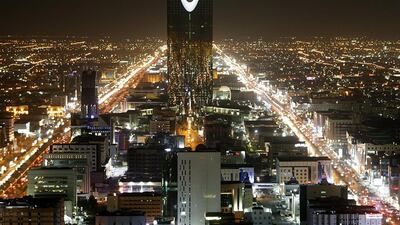Saudi Arabia plans to establish a second national airline as part of a new transport strategy to transform the kingdom into a global logistics centre as it looks to diversify its economy and reduce its reliance on oil.
The new strategy is expected to put Saudi Arabia in fifth position in terms of global air passenger traffic, boost its flight network to 250 destinations and double its air cargo capacity to more than 4.5 million tonnes, the state-owned Saudi Press Agency said on Wednesday.
It did not provide details on the structure of the new entity or the timetable for its formation.
"This strategy will contribute to advancing technical capabilities and human capital in the transport and logistics sector, invest in our country’s strategic position at the heart of three continents and further cement our integral role in the global economy," said Saudi Crown Prince Mohammed bin Salman, who is also chairman of the Higher Committee for Transport and Logistics.
Saudi Arabian Airlines, or Saudia, is the national carrier and the biggest operator in the kingdom. Others include budget airlines Flyadeal, owned by Saudia, and Flynas, which is owned by Prince Alwaleed bin Talal’s Kingdom Holding.
Plans to boost the contribution of the transport and logistics sectors to gross domestic product are part of the kingdom's broader strategy to diversify its economy, develop its non-oil sector, create jobs and attract foreign investment and talent.
Saudi Arabia, the Arab world's largest economy and largest exporter of oil, will also develop its port, rail and road infrastructure, SPA reported, quoting Prince Mohammed.
The kingdom has some of the largest ports in the Middle East after the UAE, in Jeddah, Yanbu and Dammam.
Under the new strategy, Saudi Arabia will increase its passenger and freight rail network to 8,080 kilometres, from 5,330km currently.
The railway will pass through modern logistic zones, economic centres, industrial cities and mining clusters.
A crucial goal of the strategy will be to increase the contribution of the transport and logistics sectors to national GDP to 10 per cent, from 6 per cent currently, by 2030. This will increase the sectors' annual contribution to non-oil revenue to 45 billion Saudi riyals ($12bn) by 2030.
Sustainability goals include a 25 per cent reduction in fuel consumption through the adoption of the latest technology and global best practice in passenger and cargo transport, SPA reported.
Saudi Arabia's economy is expected to grow 2.1 per cent this year and 4.8 per cent in 2022, the International Monetary Fund said in May.
Non-oil growth is projected at 3.9 per cent in 2021 and 3.6 per cent in 2022 compared to a contraction of 2.3 per cent in 2020, according to the Washington-based lender. Real oil GDP growth is projected to shrink 0.5 per cent in 2021 given production levels agreed by the Opec+ and expand 6.8 per cent in 2022 as the alliance's agreement ends.
Saudi Arabia's plans to boost air cargo volumes amid an increase of global demand for air freight during the Covid-19 pandemic.
Global trade hit a record high in the first quarter of 2021, growing 10 per cent on the first quarter of last year as economies continue to recover from the pandemic, the UN Conference on Trade and Development said in May.
In April, Middle Eastern carriers posted a 15.3 per cent rise in international cargo volumes compared to April 2019, according to the International Air Transport Association (Iata).
"This was a significant improvement compared to the previous month," Iata said. "Seasonally adjusted volumes remain on a robust upward trend."


